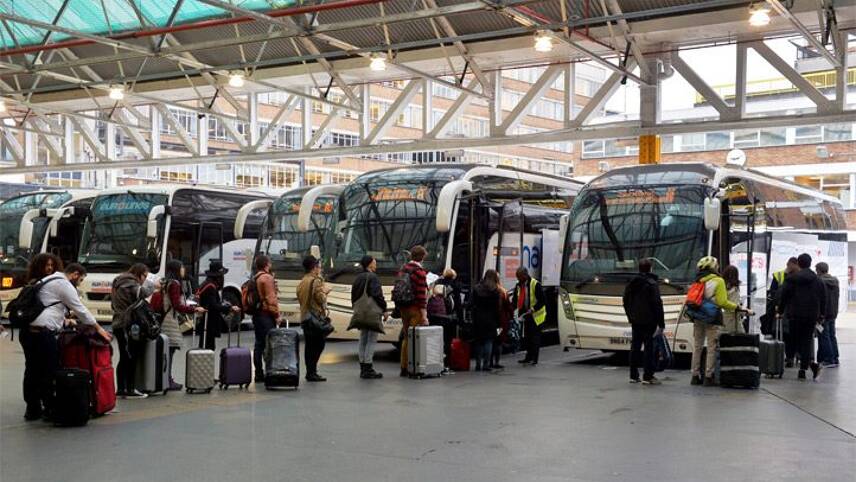Register for free and continue reading
Join our growing army of changemakers and get unlimited access to our premium content

National Express has nine bus garages and 650+ coach destinations in the UK
The commitment, made late last week as part of a broader array of climate targets, will require the firm to never buy another diesel bus for its UK fleet again.
In order to begin the transition in the bus fleet, National Express will introduce its first zero-emission buses into its West Midlands fleet in the coming weeks. Once this roll-out is complete and drivers provide feedback on potential barriers, the firm will place a “major order” for electric buses, to be integrated more broadly across the UK.
National Express said in a statement that it had chosen to begin its bus transition in the West Midlands because local authorities in the region have recently received a share of the Government’s £5bn bus fund and because the draft Birmingham Transport Plan “shows a desire for leadership and change”. In line with Birmingham’s commitment to become a net-zero city-region by 2030, the Plan prioritises new infrastructure for buses and support for rapid transit bus routes.
As for coaches, National Express has set a longer timeframe for fleet decarbonisation because it does not believe there are currently commercially viable zero-emission vehicles suitable for all long-distance coach routes.
To that end, it will begin by trialling fully electric coaches on the Stanstead Airport service – one of its shorter routes – while partnering with other firms to develop a bespoke coach alternative. National Express said in a statement that it will “shortly launch a procurement competition to choose the manufacturers and partners” needed to meet its coach ambitions.
National Express Group’s chief executive Dean Finch said that while buses and coaches are lower-emission than individual petrol and diesel car journeys when used efficiently, and while National Express has been investing in lower-emission vehicles for several years, reaching zero-emissions fleets is “simply is the right thing to do for our customers, the communities we serve and our stakeholders.”
“Working in partnership with National Express in the last three years we have managed to deliver an increase in passengers, brand-new buses and fare freezes,” West Midlands Mayor Andy Street added.
“Now I am delighted to be working with the company again to help tackle the region’s climate emergency. Air pollution is a major contributor to climate change in the West Midlands and we need to make sure people across the region are being presented with clean, viable alternatives to the car.”
A green bonus
Aside from fleet electrification – through a combination of pure electric vehicles, hybrids and hydrogen vehicles – National Express’s new climate commitments link senior executive pay to decarbonisation progress for the first time.
Under the commitments, 25% of senior executives Long Term Incentive packages will be linked to delivery against the 2030 bus and 2035 coach aims.
Other firms linking staff pay to decarbonisation include Shell, whose 150 most senior executives had their monthly pay packets tied to progress against its three-year emissions reduction targets in 2019. Repsol and BP have also made similar moves, while the likes of Britvic, Thames Water and Philips have plumped for loans with sustainability-linked rates.
While the trend towards linking staff pay to environmental progress has experienced an uptick in recent months – buoyed by a new wave of citizen climate activism, scientific research and stricter green policies – recent research found that just 6% of UK chief executives have financial incentives and bonuses tied to environmental strategies and performance across the business practice. The same study, concluded in December 2019, found that 90% of UK businesses had no financial incentives to focus on environmental sustainability at all.
Five key considerations for businesses investing in electric vehicles
Readers working to integrate electric vehicles into their organisation’s fleet are encouraged to read the key takeaways from a recent edie webinar which covered the accelerating the electrification of business fleets.
Hosted in association with EDF Energy, the masterclass webinar explored the various ways companies can begin their journey to mass adoption of EVs – and the financial incentives, and barriers, along the road. You can read the takeaways here and watch the webinar on-demand here.
Sarah George


Please login or Register to leave a comment.